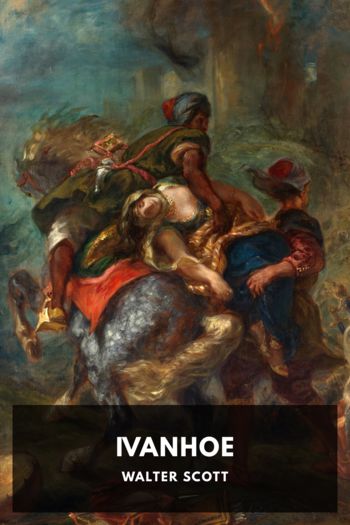Ivanhoe - Walter Scott (bookreader txt) 📗

- Author: Walter Scott
Book online «Ivanhoe - Walter Scott (bookreader txt) 📗». Author Walter Scott
Such was the scene in the castle-yard at Coningsburgh when it was entered by Richard and his followers. The seneschal or steward deigned not to take notice of the groups of inferior guests who were perpetually entering and withdrawing, unless so far as was necessary to preserve order; nevertheless he was struck by the good mien of the Monarch and Ivanhoe, more especially as he imagined the features of the latter were familiar to him. Besides, the approach of two knights, for such their dress bespoke them, was a rare event at a Saxon solemnity, and could not but be regarded as a sort of honour to the deceased and his family. And in his sable dress, and holding in his hand his white wand of office, this important personage made way through the miscellaneous assemblage of guests, thus conducting Richard and Ivanhoe to the entrance of the tower. Gurth and Wamba speedily found acquaintances in the courtyard, nor presumed to intrude themselves any farther until their presence should be required.
XLIII found them winding of Marcello’s corpse.
And there was such a solemn melody,
’Twixt doleful songs, tears, and sad elegies—
Such as old grandames, watching by the dead,
Are wont to outwear the night with.
The mode of entering the great tower of Coningsburgh Castle is very peculiar, and partakes of the rude simplicity of the early times in which it was erected. A flight of steps, so deep and narrow as to be almost precipitous, leads up to a low portal in the south side of the tower, by which the adventurous antiquary may still, or at least could a few years since, gain access to a small stair within the thickness of the main wall of the tower, which leads up to the third story of the building—the two lower being dungeons or vaults, which neither receive air nor light, save by a square hole in the third story, with which they seem to have communicated by a ladder. The access to the upper apartments in the tower which consist in all of four stories, is given by stairs which are carried up through the external buttresses.
By this difficult and complicated entrance, the good King Richard, followed by his faithful Ivanhoe, was ushered into the round apartment which occupies the whole of the third story from the ground. Wilfred, by the difficulties of the ascent, gained time to muffle his face in his mantle, as it had been held expedient that he should not present himself to his father until the King should give him the signal.
There were assembled in this apartment, around a large oaken table, about a dozen of the most distinguished representatives of the Saxon families in the adjacent counties. They were all old, or, at least, elderly men; for the younger race, to the great displeasure of the seniors, had, like Ivanhoe, broken down many of the barriers which separated for half a century the Norman victors from the vanquished Saxons. The downcast and sorrowful looks of these venerable men, their silence and their mournful posture, formed a strong contrast to the levity of the revellers on the outside of the castle. Their grey locks and long full beards, together with their antique tunics and loose black mantles, suited well with the singular and rude apartment in which they were seated, and gave the appearance of a band of ancient worshippers of Woden, recalled to life to mourn over the decay of their national glory.
Cedric, seated in equal rank among his countrymen, seemed yet, by common consent, to act as chief of the assembly. Upon the entrance of Richard (only known to him as the valorous Knight of the Fetterlock) he arose gravely, and gave him welcome by the ordinary salutation, Waes hael, raising at the same time a goblet to his head. The King, no stranger to the customs of his English subjects, returned the greeting with the appropriate words, Drinc hael, and partook of a cup which was handed to him by the sewer. The same courtesy was offered to Ivanhoe, who pledged his father in silence, supplying the usual speech by an inclination of his head, lest his voice should have been recognised.
When this introductory ceremony was performed, Cedric arose, and, extending his hand to Richard, conducted him into a small and very rude chapel, which was excavated, as it were, out of one of the external buttresses. As there was no opening, saving a little narrow loophole, the place would have been nearly quite dark but for two flambeaux or torches, which showed, by a red and smoky light, the arched roof and naked walls, the rude altar of stone, and the crucifix of the same material.
Before





Comments (0)